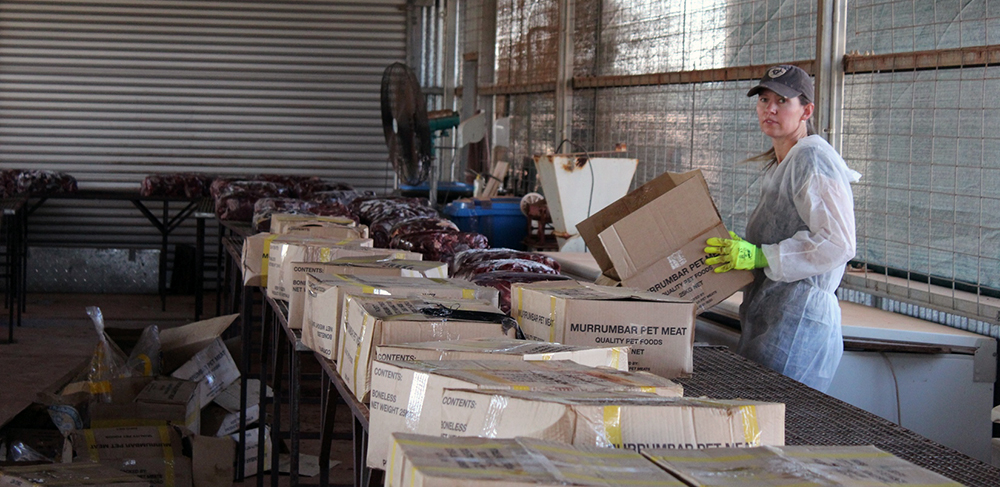Western Local Land Services successfully carry out autumn baiting program
Wild dogs are a significant problem in western New South Wales, preying on livestock and causing losses to productivity and profitability at the farm gate.
Just recently, Western Local Land Services, in partnership with 14 Landcare and pest animal control groups, successfully completed its autumn baiting program that targets wild dogs in the Western region. The program, which uses both ground and aerial baiting, resulted in 149,000 baits being issued.
In total, 246 properties were involved in ground baiting while 87 properties were involved in aerial baiting, demonstrating the planning and coordination that was required to carry out this program.

Photo Caption: Senior Land Services Officer, Jasmine Wells unpacks frozen red meat onto the drying racks at Yathonga, prior to their use in the autumn baiting program. Photo: Western Local Land Services
A whole-of-community effort is required to best manage wild dogs in the Western region, as past experience shows optimal results are achieved when landholders operate collaboratively and in a coordinated manner.
Western Local Land Services, along with NSW Farmers Wild Dog Coordinator Bruce Duncan and Western Landcare NSW, offer a range of support for landholders and community groups with their baiting programs.
While wild dogs and other pest animals continue to be a major issue for landholders, Western Local Land Services Community Manager, Andrew Hull believes the programs are having the desired effect.
“When it comes to managing pest animals it really needs to be a coordinated approach between landholders, their neighbours and local communities,” Andrew said.
“It was very pleasing that there were 14 pest animal control groups, four of which are new, to work with during our autumn baiting program.
“Pest management of this kind is only effective at a large scale, so landholders not involved with a pest animal control group are strongly encouraged to join their nearest one,” Andrew said.
“There are financial benefits from being incorporated into a group, as well as a range of other support. If there isn’t an active group in your area, Western Local Land Services can assist with resources to get a group established.”
The best techniques for managing wild dogs are:
• a coordinated effort between Western Local Land Services, other support services and landholders
• landholders reporting sightings to Western Local Land Services so resources are directed to the right areas. Landholders should also contact their neighbours if they have wild dogs on their property to coordinate control activities
• landholders increasing their skills and knowledge of how to manage wild dogs by working with Western Local Land Services.
Landholders can also carry out a number of other activities, such as using motion sensor surveillance cameras, ensuring information gets entered into the feral scan community website, and trapping to best manage the issue of wild dogs.
While the autumn wild dog baiting program has wrapped up, planning for wild dog baiting in spring is well advanced and will continue up until pest animal control groups receive their baits.
Landholders looking to get more information regarding pest animal control groups in their local area should contact their nearest Western Local Land Services office.
For further information about the spring program, landholders can contact Andrew Hull on (02) 6870 8623.



